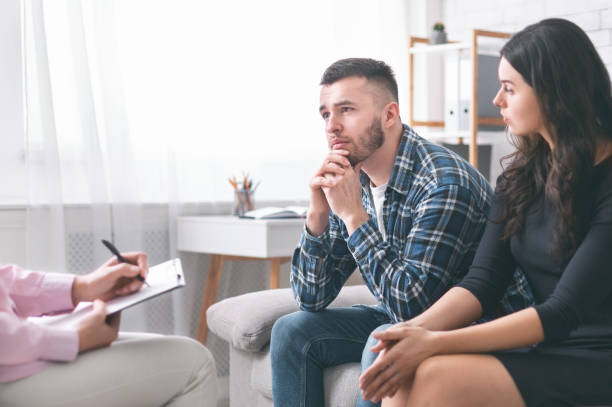COUPLES AND RELATIONSHIP THERAPY

What is Couples and Relationship Therapy?
Couples and relationship therapy or counselling is a specific type of talking therapy which helps people deal with their relationship difficulties and issues. It can address wide range of relationship issues such as recurring conflicts, feelings of disconnection, an affair, issues related to sex, or difficulties due to external stressors, etc. It is suitable for individuals, couples and families. Whether you are seeking individual help for relationship issues or for marriage guidance or family therapy, this specialized service is beneficial in supporting anyone wanting to improve the quality of their relationships and improving relationship skills. Therapists who practice relationship, marital and family therapy are trained to work specifically in these areas.
- How long is the duration of therapy?
A minimum of three to six sessions are advisable to achieve noticeable results in all relationship counselling.
- How does Couples and Relationship Therapy help?
Couples and relationship counselling helps individuals, couples and families understand their relationship patterns and explore family dynamics, personal attitudes, values and differences. It also helps people understand relationship issues more clearly in context with their culture, gender, ethnicity and others life experiences. It is most beneficial in helping people deal with conflict in relationships and to improve communication skills.
- What to expect from the therapy?
Typically, the first couples therapy session begins with some standard interview questions regarding the history of the relationship as well as deep diving into each partner’s family-of-origin, values, and cultural background. The therapist or marriage counselor also might use the initial sessions for crisis intervention if necessary. Couples therapists often employ an integrated approach to treatment, borrowing techniques from different forms of therapy, depending on your needs.
These are some of the strategies a couples therapist might employ:
- Getting to know you: The therapist creates a sense of safety by getting to know you and your partner. They work actively and collaboratively with you to help you understand yourself and your partner better.
- Identifying feelings: The therapist helps you and your partner identify feelings and put them into words to one another.
- Exploring the past: Couples therapy can involve exploring your past, since that can help you better understand your fears, motivations, and behaviors in a relationship. It can also help address unresolved conflicts that affect your present.
- Focusing on solutions: Your therapist will work with you and your partner to resolve issues, correct negative behavior patterns, and focus on positive aspects of the relationship.
- Teaching skills: Couples therapy can help teach you and your partner anger management, problem solving, and conflict resolution skills. The aim is to equip you and your partner with tools to help you deal with issues as they crop up.
While some therapists use an eclectic mix of techniques, others use only specific therapeutic approaches. This really depends on the therapist’s training, experience, and philosophy. What follows are some common techniques that are used to help couples resolve issues and improve their relationship such as Emotionally focused therapy or EFT. EFT is based on attachment theory, and aims to foster healthy interdependency between members of the couple or family. Other types of relationship therapy include Imago therapy, Solution-focused couples therapy, Cognitive behavioral therapy and the Gottman method.
- How is Couples and Relationship therapy different from other talking therapies?
There are several schools of thought or models of individual counselling but couples and family therapy sees relationships in terms of family systems. This means that people are not seen in isolation from each other but as part of a system or family unit. This type of therapy helps people understand how their family units works by looking at family patterns from the past to the present. This approach can help people make sense of their current relationship problems or difficulties.
- Getting the most out of Couples and Relationship Therapy
To get the most out of couples and relationship therapy it helps if you are able to:
🔵 clarify the reasons you are coming to counselling
🔵 clarify any goals you want to work towards
🔵 be realistic about what’s possible to change in your relationship
🔵 have a willingness to listen, be open to change and new ideas
🔵 have a willingness to learn and practice new relationship skills
- References
- https://www.rcpsych.ac.uk/
https://www.verywellmind.com/couples-therapy-definition-types-techniques-and-efficacy-5191137
https://www.talkspace.com/blog/everything-you-need-to-know-about-couples-therapy/
If you are experiencing similar
problems please contact us
+971 52 861 7053
Call / WhatsApp Us
